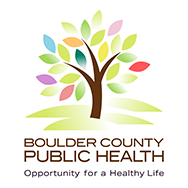Water is the world’s most precious resource. Besides being essential for life, it stabilizes our climate, irrigates our crops, and lights our cities. Although 80% of the Earth’s surface is covered by water, only 0.5% is usable fresh water.
Humans are just one aspect of the larger ecosystem that is Planet Earth, and we share this resource with plant and animal species that also need water to survive.
Of the available fresh water worldwide, 5% is used by households, 75% by agriculture, and 20% by industry. In Colorado, 10% of fresh water is used in the cities, while 90% is used by the agricultural community.
Clean water is becoming harder and harder to find; thus, we must take steps to protect and improve this resource. The impacts of pollution and population on water is the responsibility of us all.
Steps to Protect the Water Quality of Our Streams and Rivers
- Keep it clean, ’cause we’re all downstream! – Report spills via the Boulder Emergency Response Hotline, 303-441-4444. Pick up pet waste.
- Dispose of chemicals (such as motor oil, gasoline, antifreeze, solvents, paints, pesticides) properly. Don’t pour chemicals down the drain, onto the ground, or into the storm sewer – they end up in the creek (See Boulder County’s Household Hazardous Waste website for information on disposing of these chemicals).
- Take your car to a professional car wash instead of washing it in the driveway. Car washes treat waste water. If you do wash at home, prevent soap runoff from reaching the storm sewer, and use waterless soap or avoid soap that contains chlorine, chlorine bleach, phosphates, nitrates, or ammonia.
- Use minimal amount of fertilizer on lawns and gardens. Avoid using when a rain shower is expected.
- Use alternative pest management techniques instead of pesticides. Avoid using pesticides when a rain shower is expected.
- Clean driveways and sidewalks by sweeping instead of using a hose and water. Don’t wash lawn clippings or leaves down the storm drain.
- Water the lawn when it’s dry rather than on a calendar schedule. Don’t water the pavement. Minimize paved surfaces when landscaping.
- Limit driving and other fossil fuel use; keep your car maintained; use mass transit (SS, TDS, nitrate, phosphate, pH, SC, DO, organic chemicals).
- Use alternatives to household cleaners and avoid putting hazardous chemicals down the drain.
- Don’t remove trees and bushes from along streams.
- Maintain onsite wastewater (septic) systems properly.
- Use good animal keeping practices at cattle feedlots, hog farms, dairies, and barnyards to avoid animal waste reaching surface water.
- Prevent sediment from washing off a construction site.
- Help prevent forest fires.
Partners in Water Quality
Boulder County is proud to support the Watershed Approach to Stream Health (WASH), a partnership of communities working together to protect our water quality.


